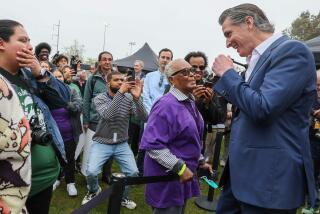Cuban Americans Watch, Wonder, Hope
There were two rather extraordinary news events competing for the attention of Americans on Thursday: a potentially catastrophic sex scandal for President Clinton and the pope’s historic visit to Cuba.
The Cuban American reality, however, is that el Papa beats el presidente--any presidente--any time.
“Fantastico! El Papa en Cuba!” cried Modesta Pordomo during a quick afternoon shopping trip to El Cubano market in North Hollywood. The trip had to be quick--coverage of John Paul II’s visit was about to resume on television.
“I watch all day,” Pordomo said in the rapid-fire Spanish of her native country. “I think the pope will bring progress.”
From the Pico-Union area of Los Angeles to Glendale to Encino, Cuban Americans debated the effect the pope’s visit was likely to have on an island they say has languished since 1959, when Fidel Castro took control of their Caribbean paradise and turned it into a repressive communist outpost.
While Castro was universally lambasted Thursday by a community that is fervently anti-communist, not all the exiles agreed that a papal visit would lead to reforms, as it did, say, in Poland in 1979.
“It’s not going to change,” said 78-year-old Angel Rodriguez, who fled Cuba after the Castro government seized his Havana home and motorcycle shop, and who has watched hours of the pope’s visit but quickly flicks off the TV whenever Castro’s bearded face appears.
“It’s never going to change,” he said with a shake of his head.
As Thursday wore on and political pundits began employing phrases such as “possible impeachment” and “criminal offense” in discussing the swirling Clinton saga, Los Angeles County’s 60,000 or so Cuban Americans continued to focus their interest on the pope. They watched television and read anti-Castro newspapers such as La Voz Libre and 20 de Mayo. They talked about little else.
*
Which is why, at first blush, the relative emptiness of Encino’s Versailles restaurant seemed so unusual. What better way to debate the future of your homeland than over half a garlic chicken and some fried plantains--and, depending on how the conversation goes, a tall glass of sangria?
“Everyone’s at home, watching on TV,” said William Garcia, who owns four Versailles restaurants with his father, Orlando. “They come in and get their food to go.”
The Garcia family fled Cuba 30 years ago, when William Garcia was 10. They weren’t wealthy landowners like many of the leaders of the anti-Castro movement in the United States. His father was an ice cream vendor.
“We just lost our freedom,” Garcia said.
After just weeks in South Florida--the cultural center for the 1.1 million Cuban exiles living in the United States--he and his father and mother came to Los Angeles and opened their first restaurant. They later opened another, then decided on a new name, Versailles, after a Cuban town where “my old man used to take me fishing,” he said nostalgically.
Garcia is hopeful, but skeptical. “Maybe there’s a change coming,” he said. “But Castro, I think he’s just trying to get some publicity for himself. He wants the sympathy of the American people so they’ll drop the embargo.”
At El Colmao, a Cuban restaurant in Pico-Union, three Cuban exiles did decide to lunch out Thursday, and, while skipping the garlic chicken, went for chicken soup before the plates of fried plantains, black beans and rice.
*
Like Garcia, they were cautiously optimistic, expressing hope that the pontiff’s visit would herald a new era of religious, and possibly even political, freedom.
“I’m very pleased with the pope’s visit because now religious freedom will be restored in Cuba,” said Andres Elvirez, 57. “At the same time, I pray to God that Fidel will free the Cuban people.”
Angel Prada said simply: “Something positive has to happen.”
Prada is editor of La Voz Libre. The current issue’s cover features a drawing of the pope holding a bloody Cuban flag with the words “Our Father, Help Cuba!” He agreed with the pope’s call to end the U.S. embargo against Cuba.
“The embargo is ineffective,” said Prada, a onetime Cuban government accountant. “Exiled Cubans send more than $1 billion home a year and that helps the communist government. If they lift the embargo, what excuse can Castro give when things continue to be as bad as ever?”
At Porto’s Bakery, a Glendale shop redolent of Cuban delicacies such as sausage pies and guava turnovers, 72-year-old Manuel Herrero y Castro had a difficult time believing that even the pope could begin to erase nearly four decades of communism.
After all, Herrero y Castro said, government officials ransacked his town’s cathedral before converting it into a Communist Party meeting place.
“A lot of people think that with this visit, Fidel will loosen up,” he said. “But I believe that while that man continues in power, there will be no changes.”
More to Read
Sign up for Essential California
The most important California stories and recommendations in your inbox every morning.
You may occasionally receive promotional content from the Los Angeles Times.










